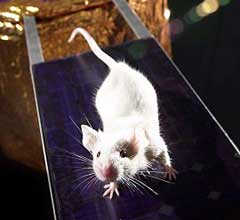Scientists at the Salk Institute in San Diego have created mice with human brain cells in an effort to make realistic models of neurological disorders such as Parkinson’s disease. The researchers injected about 100,000 human embryonic stem cells per mouse into the brains of 14-day-old rodent foetuses.
Those mice were each born with about 0.1 per cent of human cells in each of their heads, a trace amount that the scientists say does not remotely come close to “humanising” the rodents. Mice are already 97.5% genetically identical to humans.

Three cloning researchers provoked controversy with applications for a patent that contemplates fusing a complete set of human DNA into animal eggs in order to manufacturer human embryonic stem cells.
Doctors have transplanted pig valves into human hearts for years, and scientists have injected human cells into lab animals for even longer.
In 1995, Charles Vacanti and Linda Griffith-Cima caused a furore when they grew an engineered human ear on the back of a mouse.
But experiments involving the brain pose an additional level of concern because some envision scenarios in which a human mind might be trapped in an animal head.
“Human diseases, such as Parkinson’s disease, might be amenable to stem cell therapy, and it is conceivable, although unlikely, that an animal’s cognitive abilities could also be affected by such therapy,” said a report by the National Academies of Science. The report recommended that such work be allowed, but with strict ethical guidelines established.
Via The Scotsman.
Previously: Mice with human brains?, Utility pets.
Also in the news today: Animal transplants into humans given go ahead in New Zealand.
